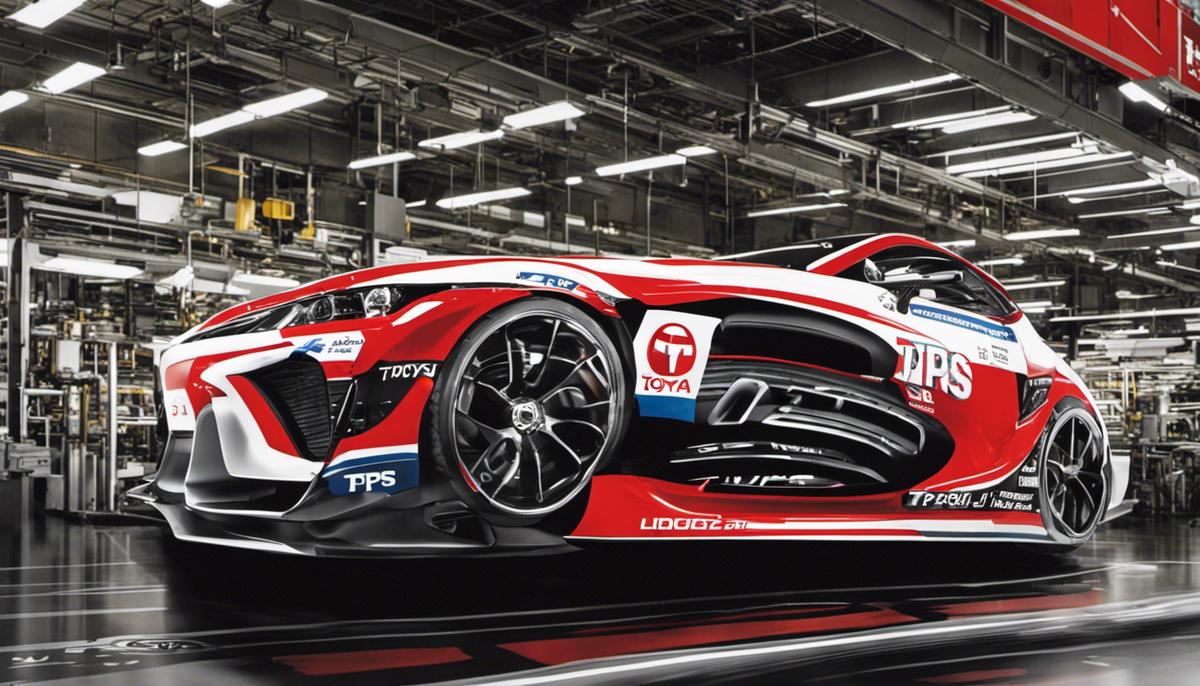As a world-renowned leader in the automotive industry, Toyota stands out with its unique ‘Lean Manufacturing’ principles as the bedrock of its production philosophy. Core components of this approach, such as ‘Just-In-Time’ and ‘Jidoka’, set Toyota apart from its competitors, underpinning its reputation for unsurpassed quality in vehicle manufacturing. An in-depth scrutiny of this dynamic enterprise reveals the extraordinary measures it undertakes in ensuring superior quality at every phase of production. More significantly, the Trident is also synonymous with its own uniquely crafted Toyota Production System (TPS), an embodiment of efficiency and productivity, which largely focusses on eradicating waste and optimizing the use of its workforce. It is a testament to Toyota’s enduring drive for quality and innovation that it has established a commanding presence in the global automotive business.
Toyota’s Manufacturing Philosophy
Toyota’s Manufacturing Philosophy: Lean Manufacturing
Toyota Motor Corporation has redefined the automotive industry’s manufacturing framework with its groundbreaking and indigenous ‘Lean Manufacturing’ concept. At the core of Toyota’s manufacturing philosophy, Lean Manufacturing emphasizes minimizing waste while maximizing productivity. This is implemented without compromising on product quality, consistently leading to high-quality vehicles.
Toyota’s Lean Manufacturing strategy ensures efficiency by focusing on reducing the manufacturing process’s 7 wastes; these include overproduction, waiting, transport, over-processing, inventory, motion, and defects. By identifying and eliminating these wastes, Toyota can concoct a smooth operational process that prioritizes value.
Just-In-Time Manufacturing
A fundamental principle in Toyota’s Lean Manufacturing philosophy is the ‘Just-In-Time’ (JIT) production system. Born out of a need to manage limited resources in the post-war era, this system is designed to produce the necessary items at the necessary time and in the necessary quantities. Toyota’s JIT approach focuses on three principles: Takt time, flow production, and a pull system.
Takt time refers to the maximum amount of time allowed to produce a product in order to meet demand. By adhering to the takt time, Toyota ensures a steady production flow. Flow production then ensures a seamless transition between processes, reducing wastage of resources and time. Meanwhile, the pull system ensures that work is never performed without demand, thereby preventing overproduction.
The Concept of Jidoka
Toyota’s adherence to exceptional quality also brings to the spotlight another important principle – ‘Jidoka’. Also known as ‘automation with a human touch’, Jidoka empowers workers to stop the manufacturing process if an abnormality is detected.
The principle of Jidoka ensures that defects do not proceed to the next process, thereby avoiding large-scale, wasteful fixes later down the line, and also preventing overproduction. This allows Toyota to maintain a consistently high level of quality in their automobiles.
Toyota: A Unique Leader in Quality & Manufacturing
Toyota has established a steadfast reputation as a leader in the global automotive industry, principally due to its distinctive manufacturing philosophy. Toyota has realized an unparalleled competitive advantage by adopting Lean Manufacturing, which champions the highest standards of quality and efficiency. This commitment to excellence does not only deliver value to their customers, but also differentiates Toyota from the competition.
This harmonization of principles has led to the standardization of Toyota’s manufacturing processes, setting an influential example for various sectors to emulate. Therefore, the brand’s reputation for producing high-quality vehicles is deeply rooted in their distinctive manufacturing approach and unparalleled leadership in quality control.

Quality Control in Toyota’s Manufacturing
The Toyota Method: Unrivaled Quality Control
Empty paragraph
The quality control within Toyota’s manufacturing process serves as the epitome of meticulous attention to detail at every stage. Focusing on everything from the initial design concept to the final product, the brand’s quality control management has shaped this superior standard. This strategy is essentially grounded in the “Toyota Production System” or TPS. TPS a system devised around the principles of waste reduction and optimization of efficiency.
Key Pillars of Quality Control at Toyota
One of the key principles underlining Toyota’s manufacturing process is kaizen – the philosophy of continuous improvement. Kaizen revolves around the idea that incremental changes can lead to substantial improvements over time. As part of this process, Toyota encourages each of its employees, regardless of their roles or ranks, to suggest improvements to any aspect of the production process. These proposals are thoroughly reviewed, and those viable are implemented, reinforcing an environment of constructive criticism and continuous growth.
Alongside kaizen, teamwork forms another integral part of Toyota’s quality control. The rationale behind it being that a diverse set of ideas from a broader perspective can identify and fix problems more effectively. From the production line to the executive suite, Toyota fosters a team-oriented atmosphere, endorsing every team member’s contribution to maintaining high-quality standards.
The third critical element of Toyota’s quality management is hansei, or self-reflection. This concept encourages the introspection of deficiencies in one’s work and how they can be improved. Hansei plays a pivotal role in Toyota’s quality control, as it promotes learning from mistakes and elevating the overall quality by proactively establishing preventive measures.
Impacts of Effective Quality Control
These core elements combined have been instrumental in guaranteeing unmatched quality in Toyota’s vehicles. The kaizen process has allowed Toyota to steadily enhance its operational efficiencies and manufacturing process. Studies show that kaizen has enabled Toyota to decrease production times and boost product quality significantly.
Reinforcing teamwork has allowed for a more comprehensive assessment of the manufacturing phases, rectifying errors, and inefficiencies that may have been overlooked otherwise. It has not only refined the production process but also boosted employee morale, as each member feels valued for contributing to quality enhancement.
Lastly, the practice of hansei has instilled a culture of constant learning and evolution within Toyota. The willingness to learn from past mistakes and making amends has helped Toyota get ahead in identifying potential quality issues and rectifying them before they impact the end product. That eventually translates to high-quality vehicles that Toyota is world-renowned for.
In Retrospect
Toyota’s robust commitment towards quality control has been instrumental in its ability to manufacture vehicles of high standards. Leveraging principles like kaizen or continuous improvement, synergistic teamwork, and hansei or reflective thinking, Toyota has continually been at the cutting edge of automotive quality norms, thereby reinforcing their standing as a leading automotive manufacturer across the globe.

Toyota’s Production System (TPS)
Grasping the Concept of The Toyota Production System (TPS)
Unveiling the curtain on the Toyota Production System (TPS), an exclusive and revolutionary production system, created by the Toyota Motor Corporation. TPS is rooted in the philosophy of “absolute annihilation of all waste,” incorporating components that drive efficiency and exterminate waste. The primary goal of this system is to efficiently utilize human resources, materials, and capital, paving the way for optimal use.
Key principles that define TPS are “Just-In-Time” production and “Jidoka.”
Just-In-Time methodology seeks to minimise the time system and resources involved in the production process. It calls for manufacturing parts only when there is a need for them, thus reducing waste associated with excess inventory. Jidoka, or “automation with a human touch,” allows machines to detect problems and halt production, preventing the production of faulty products and allowing employees to address the root cause of the issue.
Application of Lean Principles in TPS
TPS is the origin of “Lean” philosophy in manufacturing, which is highly influential in modern industrial practices. Lean principles emphasise improving the flow of work and using empirical methods to decide what matters, rather than uncritically accepting pre-existing ideas.
Toyota implements Lean principles through techniques such as “Kanban” or visual management, “Kaizen” or continuous improvement, “Heijunka” or workload leveling, among others. These techniques involve employees at all levels, enabling a culture of continuous learning and improvement, and are instrumental in Toyota’s reputation for high quality and efficiency.
Influence of TPS on Modern Production systems
The influence of TPS on modern production systems can’t be overstated. Today, numerous companies across diverse sectors use Lean principles to enhance efficiency and competitiveness. TPS’s focus on waste elimination, continual improvement, and employee involvement has reshaped conventional production wisdom, shifting the focus from individual productivity measures to more holistic, flow-oriented measures.
Toyota’s Quality Leadership through TPS
Toyota’s quality leadership is closely linked to the principles and practices embodied within the TPS. The company believes in building quality into its processes, instead of relying on end-product inspection. This approach, coupled with relentless problem-solving, enables Toyota to prevent issues from occurring, rather than just correcting them.
A key element of Toyota’s distinction in quality leadership lies in its unique approach that gives prominence to its workforce. The company’s ingrained values of respect towards its staff and the promotion of team effort enables its workforce to not only identify but also rectify any arising issues. This invariably contributes to the process of constant improvement. This approach provides Toyota with an edge above the rest, as it delivers superior quality products while maintaining an optimum level of productivity and efficiency.

Toyota’s Leadership in the Automotive Industry
Unraveling the Toyota Production System (TPS)
The foundation stone of Toyota’s quality leadership is the innovative Toyota Production System (TPS), meticulously developed over the period of 1948 to 1975. The TPS is anchored in two core principles: Just-In-Time (JIT) and jidoka, which translates to “automation imbued with a human touch”. The JIT principle focuses on the production of required items, at the required time, in the required quantity, thereby minimizing waste and maximizing efficiency. On the other hand, jidoka empowers the employees to halt the production process in case of an anomaly to prevent substandard products from moving into the following process.
Commitment to Quality Control
Toyota’s robust quality control systems are integral to its reputation for reliability. Toyota’s guiding quality control principle is “Built-In-Quality,” meaning a commitment to getting things right the first time. Employees are trained to inspect each workpiece at every production stage. A quality-first mindset is instilled in all employees, and is embedded in the company’s culture at every level.
Relentless Kaizen (Continuous Improvement)
Toyota has pioneered and perfected the concept of Kaizen, which translates to “continuous improvement”. Kaizen encourages employees across all levels to identify possible improvements and implement them, no matter how small. It is a bottom-up, grassroots approach to improvement that gives every employee a voice and a role in enhancing quality and productivity.
Competitive Advantage Through Quality
Toyota’s relentless pursuit of quality has given it a distinct competitive edge. It is consistently placed at the top in consumer reliability surveys. The company’s commitment to quality has also allowed it to keep recalls to a minimum, providing a stark contrast to its competitors, many of whom have faced large-scale recalls due to quality control problems.
The Toyota Way
“The Toyota Way” is the company’s managerial approach, describing its values, methods, and business conducts. It consists of five key principles: challenge, kaizen, genchi genbutsu (go and see for yourself), respect, and teamwork. These principles guide Toyota towards its goal of superior quality.
Toyota’s Lean Methodology
Toyota has become synonymous with lean manufacturing, which is focused on maximising productivity while minimising waste. This approach enables Toyota to rapidly respond to market changes and streamline production processes, enabling shorter production times and quicker delivery of vehicles to the market.
The Influence of Toyota on the Automotive Industry
Through its dedication to quality and efficiency, Toyota has significantly shaped the global automotive industry. Many of its practices, such as JIT, Kaizen, and lean manufacturing, are now standard in the sector, indicative of the company’s leadership and innovative approach. Toyota’s emphasis on employee empowerment and continuous improvement serve as benchmarks for the industry.
Toyota’s Global Leadership in Quality and Manufacturing
Toyota’s manufacturing and quality leadership has helped it become one of the world’s largest automotive companies. Its future-focused approach, adaptable manufacturing system, and pursuit of sustainable growth have made it a global leader in quality. Toyota’s success story serves as an example for other manufacturers, underlining the importance of a systematic, disciplined, and relentless pursuit of quality.

The Toyota chronicle is a compelling narrative of a company’s unyielding commitment to manufacturing excellence and relentless pursuit of quality. Toyota’s pioneering ‘Lean Manufacturing’ philosophy, brought to life in its TPS system, has been a game-changer in the industry. Their steadfast focus on quality control has been instrumental in cementing their reputation for manufacturing products of superior quality. A crucial factor in their global dominance, Toyota’s unceasing drive to refine its manufacturing processes and reduce waste has not only set them apart from their rivals but also allows them the leverage to significantly shape the future of the automotive landscape. Indeed, Toyota’s manufacturing and quality leadership serve as an illuminating case study for industries worldwide; a beacon of innovation, precision, and efficiency.
